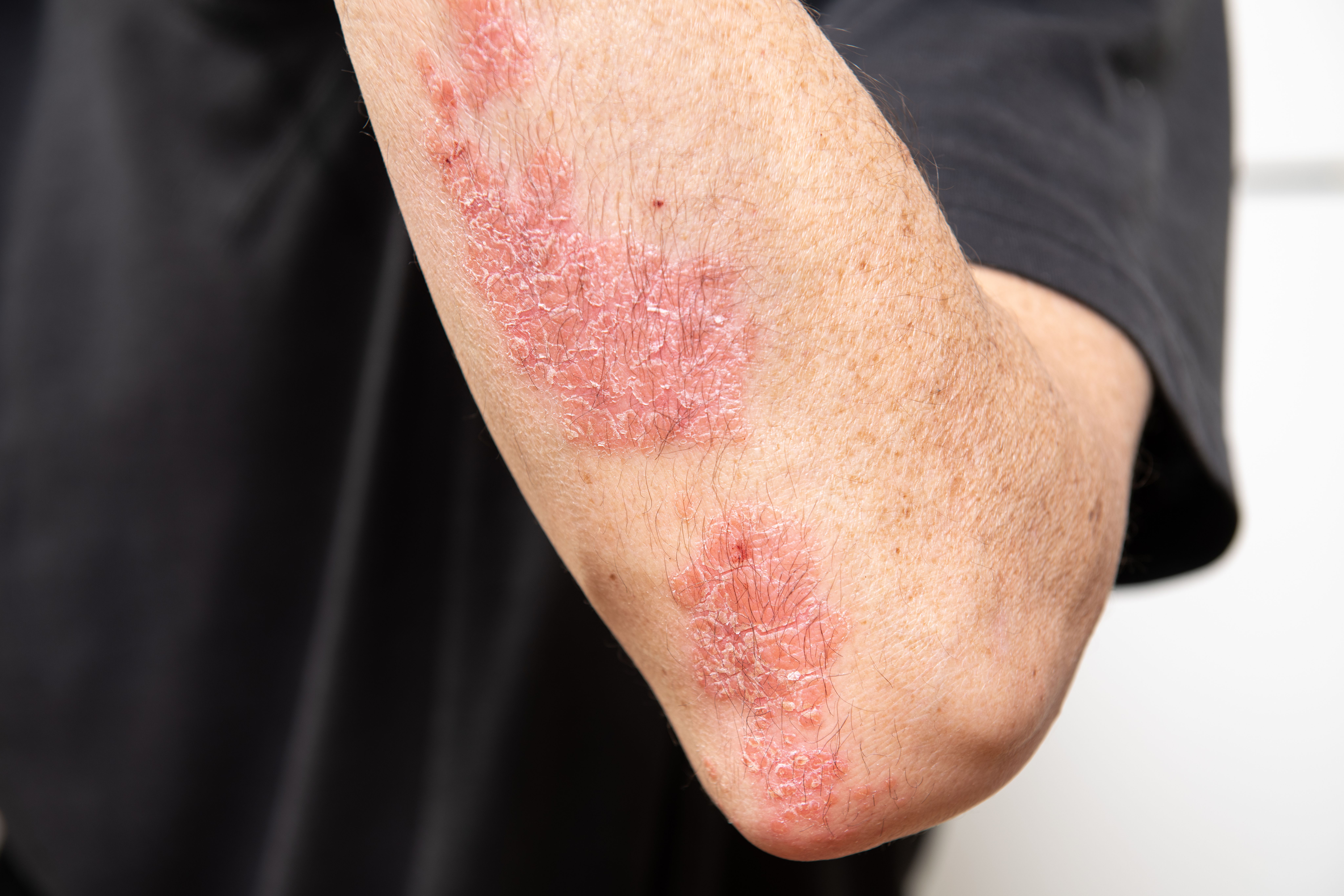- Bone Health
- Immunology
- Hematology
- Respiratory
- Dermatology
- Diabetes
- Gastroenterology
- Neurology
- Oncology
- Ophthalmology
- Rare Disease
- Rheumatology
Adalimumab Biosimilars Show Similar Outcomes in Psoriasis After Nonmedical Switch
Switching between adalimumab products does not affect drug effectiveness or treatment duration in patients who have psoriasis, according to a Danish study.
Adalimumab biosimilars GP2017 (Hyrimoz) and SB5 (Hadlima) showed no discernible differences in drug survival or effectiveness for patients who have psoriasis following a nonmedical mandatory switch from the adalimumab originator, according to a Danish nationwide cohort study.1
Switching between adalimumab products does not affect drug effectiveness or treatment duration in patients who have psoriasis, according to a Danish study. | Image credit: pimentos - stock.adobe.com

This study, published in Acta Dermato-Venereologica, was conducted to address the lack of direct comparisons between biosimilars derived from the same originator after patients undergo nonmedical switching between products.
Both Hyrimoz and Hadlima have been approved in the US and European Union.2
With the growing availability of biosimilars for moderate to severe psoriasis, it remains unclear whether those derived from the same originator, like GP2017 and SB5, perform equivalently in real-world settings. This study used a pseudorandomized observational design to compare their drug survival following a nonmedical mandatory switch from reference adalimumab to a biosimilar in a Danish population.
Researchers relied on data from DERMBIO, a Danish national registry tracking biologic treatments for psoriasis, to analyze drug survival of 2 adalimumab biosimilars, GP2017 and SB5, after a nonmedical mandatory switch in November 2018. Patients were assigned biosimilars based on regional drug allocation, creating a pseudorandomized observational design. Adults who switched from the adalimumab originator between November 2018 and April 2019 were included, and they each needed a 1-year follow-up to assess drug discontinuation rates. Kaplan-Meier plots and Cox proportional hazard regression models, adjusted for patient demographics and treatment history, were used to compare drug survival between GP2017 and SB5, with additional sensitivity analyses examining Psoriasis Area Severity Index (PASI) scores and comparisons to the originator using propensity score matching.
Of the initial 568 patients identified, 43 were excluded, leaving 525 patients who switched from the adalimumab originator (n = 268 switched to GP2017; n = 257 switched to SB5). The median age was 52 years for SB5 users and 51 years for GP2017 users, with prior adalimumab treatment durations of 7.2 and 6.8 years, respectively. Discontinuation rates were similar between the biosimilars (7.1% for the GP2017 group and 7.4% for the SB5 group; HR, 1.11; 95% CI, 0.58-2.12).
The most common reason for discontinuation was lack of effect (52.6%), followed by adverse events (31.6%). A subanalysis of patients with under 2 years of prior adalimumab use found no difference in drug survival between the biosimilars. When comparing GP2017 and SB5 with the adalimumab originator using propensity score matching, no significant difference in drug survival was observed (GP2017: HR, 1.01; 95% CI, 0.53-1.92; SB5: HR, 1.25; 95% CI, 0.68-2.29).
Additionally, there was no significant change in PASI scores following the switch, with scores remaining stable in 40.9% of SB5 users and 43.1% of GP2017 users, with slight improvements or worsening occurring in a small percentage of patients.
The study's main limitations include potential unresolved bias from differences in prior treatment experience or living conditions, reliance on drug discontinuation as the sole measure of survival, nonrandom missing data, and variability in medical appointment intervals, which could affect PASI assessments but likely had minimal impact on overall findings.
The authors concluded, “Although highly speculative, the presented results, together with previous studies, could suggest that switching between biosimilars is unlikely to negatively impact disease control.”
References
1. Sieborg J, Maul J-T, Wu JJ, et al. Real-world drug survival of biosimilar SB5 vs GP2017 following a mandatory non-medical switch from adalimumab originator for psoriasis: a nationwide cohort study. Acta Derm Venereol. Published online March 3, 2025. doi:10.2340/actadv.v105.42572
2. Jeremias S. First round of adalimumab biosimilar launches in July. The Center for Biosimilars®. July 2, 2023. Accessed March 25, 2025. https://www.centerforbiosimilars.com/view/first-round-of-adalimumab-biosimilar-launches-in-july
Newsletter
Where clinical, regulatory, and economic perspectives converge—sign up for Center for Biosimilars® emails to get expert insights on emerging treatment paradigms, biosimilar policy, and real-world outcomes that shape patient care.
